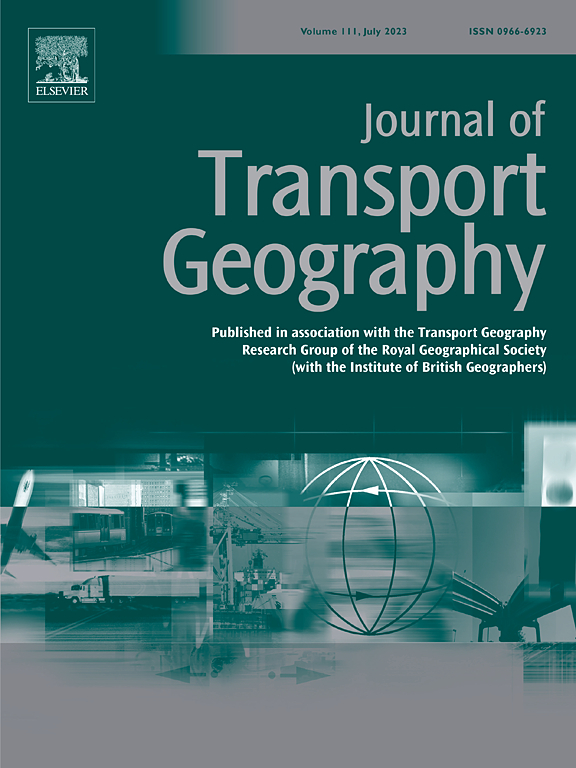交通地理学研究中gps轨迹与活动旅行日记的交叉验证
IF 6.3
2区 工程技术
Q1 ECONOMICS
引用次数: 0
摘要
交通和健康研究需要详细的背景信息,以建立建筑环境因素、流动性特征和健康结果之间的因果关系。然而,目前的方法在可靠地获取上下文属性方面面临各种挑战。因此,研究从不同时间-地理方法中收集的上下文属性的组合能力对于提高上下文属性的数据质量至关重要,而这在以往的研究中是缺失的。为了解决这一问题,本研究采用了香港横断面调查收集的数据来交叉验证活动旅行日记和gps衍生轨迹,这是交通地理学研究中的两种主要数据收集方法。我们通过分层抽样方案在四个代表性社区招募了782名参与者。参与者被要求分别在工作日和非工作日填写活动旅行日记,并携带配备gps的智能手机。使用时空聚类算法从gps衍生的轨迹中识别出停留/移动事件,同时将活动-旅行记录手动聚合为活动-旅行事件,然后将其与相应的停留/移动事件进行匹配。严格的预处理表明,在8500个检测到的事件中,约有90%的事件在两种方法之间匹配良好,其中约76%是一对一匹配的事件。然而,匹配率在不同的社会人口群体、地理和活动背景之间存在显著差异。研究结果表明,基于GPS的事件可以减轻活动/旅行时间性的回忆偏差,而基于日记的事件提供了丰富的背景属性,而GPS数据本身无法提供这些属性。我们的研究系统地阐明了收集环境属性的不同方法之间的(错误)匹配,并为需要详细和全面的环境信息的广泛环境和运输研究提供了基本的见解和协议。本文章由计算机程序翻译,如有差异,请以英文原文为准。
Cross-validation between GPS-derived trajectories and activity-travel diaries for transport geography studies
Transport and health studies need elaborated contextual information to establish causally relevant associations between built environment factors, mobility characteristics, and health outcomes. However, current approaches face various challenges in reliably obtaining contextual attributes. Therefore, investigating the capability of combining contextual attributes collected from different time-geographic approaches is essential for promoting data quality of contextual attributes but missing in previous studies. To address this issue, this study employed data collected in a cross-sectional survey in Hong Kong to cross-validate activity-travel diaries and GPS-derived trajectories, two primary data collection approaches in transport geography studies. We recruited 782 participants in four representative communities through a stratified sampling scheme. Participants were asked to fill out activity-travel diaries and carry a GPS-equipped smartphone on a working day and a non-working day, respectively. Staying/moving events were identified from the GPS-derived trajectories using a spatiotemporal clustering algorithm while activity-travel records were manually aggregated as activity-travel events, which were then matched with the corresponding staying/moving events. Rigorous preprocessing revealed that about 90 % of the 8500 detected events matched well across the two approaches, and about 76 % of them are one-to-one matched events. Yet, the matching rate shows significant disparities between different socio-demographic groups and geographic and activity contexts. The findings indicate that GPS-derived events can mitigate recall biases in the temporality of activity/travel, while diary-based events provide enriched contextual attributes unavailable from GPS data alone. Our study systematically articulates the (mis)match between different approaches for collecting contextual attributes, and it provides essential insights and protocols for a broad scope of environmental and transport studies that need elaborate and comprehensive contextual information.
求助全文
通过发布文献求助,成功后即可免费获取论文全文。
去求助
来源期刊

Journal of Transport Geography
Multiple-
CiteScore
11.50
自引率
11.50%
发文量
197
期刊介绍:
A major resurgence has occurred in transport geography in the wake of political and policy changes, huge transport infrastructure projects and responses to urban traffic congestion. The Journal of Transport Geography provides a central focus for developments in this rapidly expanding sub-discipline.
 求助内容:
求助内容: 应助结果提醒方式:
应助结果提醒方式:


